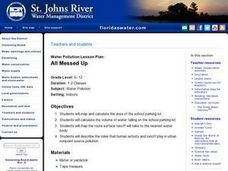Curated OER
The Effects of Pesticides on the Food Chain
Fourth graders generalize that all animals, including people, depend on plants as a food source. In this science lesson plan, 4th graders describe and construct a food chain, tell how pesticides enter the food chain, and discuss possible...
Curated OER
Pesticides and Eggshell Thinning.
Students analyze the calcium content of egg shells as an introduction to the toxic effects of pesticides on biological systems.
Curated OER
Peregrine Falcon
Young environmentalists study the effects that pesticides have on birds, such as the peregrine falcon. They also look at predator/prey interactions. Some wonderful in-class activities accompany an inventive instructional activity. After...
Curated OER
You Are What You Eat: Chemical Residues and Consumers
Young scholars determine how evidence gained from a simulated test for the presence of pesticide residues can be used to determine risk. They use peas to simulate pesticide residue testing.
Curated OER
Insects: Bug Off
Students design and conduct an experiment to test three organic pesticides to control ants. They view a video that demonstrates ant behavior and the role of pesticides in insect control. In small groups, they set up behavior...
Curated OER
Pollution Prevention in Schools
Students review P2 concepts they learned in previous lessons and explore how to reduce the pollution in their school. They also examine ways to conserve energy.
Florida Department of Environmental Protection
Build Your Own Aquifer
Ever wondered how an aquifer works? Introduce your class to the amazing way many people get water by exploring how underground aquifers work. Two fun hands-on activities are used to help kids understand what an aquifer is, how it works,...
Curated OER
LD50 of NaCl to Gammarus spp.
Young scholars learn the meaning of LD50 through lecture and discussion. Through experiment, students graph and calculate the LD50 of salt on fresh water amphipods. Young scholars compare results of the experiment with pesticides and...
Curated OER
Petroleum Poisons
Students discover how harmful petroleum distillates are that are found in the home. They demonstrate how to collect information about consumer products. They also ask their parents about the safety of the cleaning supplies used in their...
Curated OER
All Messed Up
Students begin the experiment by mapping and calculating their school parking lot. They calculate the volume of water falling on the lot and map the route the water runoff takes. They discuss the roles that humans play in affecting water...
Curated OER
Wetlands Project
Middle schoolers discover how wetlands filter out contaminants before they can reach other bodies of water. In groups, they design and build a model of a stormwater wetland. They test the water quality and inform their classmates about...
Curated OER
Florida's Springs
Students illustrate how water is stored and the water cycle. They discover how underground water can become contaminated.
Curated OER
Children's Health
Students learn the basic parts of an insect, where they like to hide indoors, and how to safely get rid of them. They assemble the cockroach body and cut it out of a brown bag. They attach pipe cleaners as legs and attennae. They then...














